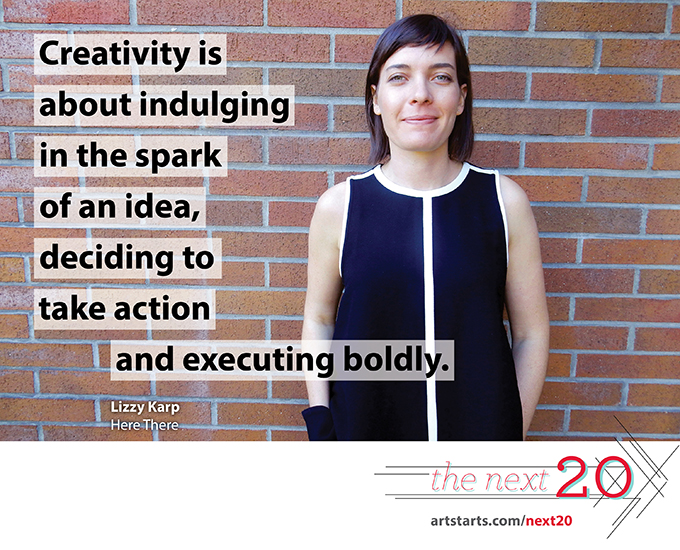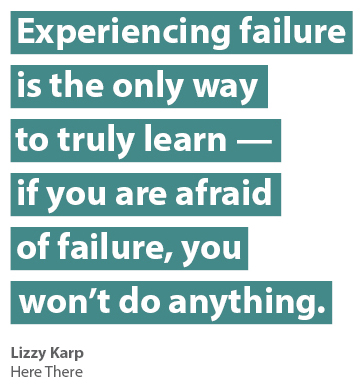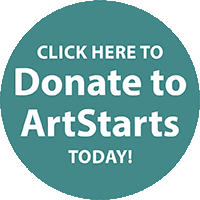May 17, 2016
The Next 20: Lizzy Karp

This year is ArtStarts' 20th Anniversary. As we celebrate our accomplishments and impact, we are also inspired to think ahead about what the next 20 years hold for young people. What role can art and creativity play to support our next generation to thrive in the future?
To help us explore this question, we sat down with 20 community leaders across different sectors and asked them to share their story and thoughts on the relevance of art and creativity. Over 20 weeks, we'll share these stories with you. We hope that they will inspire you to join our community of supporters so that together we can continue to build a bright future for BC's young people.
This week's Next 20 community builder is Lizzy Karp, co-founder of various Vancouver-based initiatives that truly shape community connections and creativity. Her projects include: Here There, a studio that focusses on creative direction in a range of disciplines from film-making to multi-sensory event design; Rain City Chronicles, a live event series featuring true personal stories in unique venues around Vancouver; and A Good Book Drive, an annual book drive that brings stories to new generations of readers and supports kids in need of new books. Lizzy was also named as one of the Top 30 Under 30 by BC Business in 2015.
How would you define creativity?
Creativity is about indulging in the spark of an idea, deciding to take action and executing boldly. It is the spirit of saying yes to things. It is about asking, "what if…?" Asking questions is what gets you to creativity.
What have been some key influences in your life?
I grew up in Salt Lake City, Utah, in a predominantly Mormon community. While I was not part of this religious community, living there helped me understand the value and power of community. When I lived in Toronto for university I connected with many local musicians, comedians and writers and loved being amongst people who wanted to connect and collaborate together. I was particularly inspired to meet the people behind the scenes who created the space to allow this multifaceted creative scene to thrive. The spirit of bringing different people together was what I carried with me when I moved to Vancouver in 2009.
What does creativity look like in your personal/professional life?
I am a part of a creative studio called Here There that produces events and memorable experiences that breathe life into Vancouver. We call ourselves event designers as event planners doesn't quite describe what we do. When we design an event it starts with a spark of inspiration—sometimes it's a particular space or a new partnership. We develop a mental image of what might be possible and then work backwards to see how we can make it happen. A lot of research goes into producing each event, which is an important part of our creative process.
Personally, one of the most creative things I've done in the last five years was to sign up for synchronized swimming. I love swimming, so this was an opportunity to explore my creativity through my body and do something I did not know how to do. Synchronized swimming is this bright, colourful and bizarre art. I threw myself into the music and the makeup and the crazy bathing suits. Just surrendering to the process helped me learn a lot about my own creativity.
What inhibits the development of creativity?
Being constrained by the traditional idea that creativity is about being artistic—it is much more than that. The other thing that inhibits creativity is to assume that you can only do the one thing that you are very good at and then limit yourself in other areas.
 When you were young, what did you want to be when you grew up?
When you were young, what did you want to be when you grew up?
When I was young I wanted to be a writer. I was identified as a creative person at an early age and I wanted to keep that identity going. My parents and sister worked in healthcare and it started to become clear that I was not going to follow in their footsteps. Now when my family comes to an event that I have produced they're blown away and ask, "Where did you learn to do this? How did you become this?"
What is the purpose of school?
School is for kids to learn how to work together and how to work alone. School is an epicentre of community and ideally it should be a safe space for kids to take risks. Experiencing failure is the only way to truly learn—if you are afraid of failure, you won't do anything.
What do you think the world will be like in 20 years?
When I think about the future, I get excited to think about the potential of technology + creativity + storytelling. We have already found that through the accessibility that technology offers, we get to hear stories from different voices that have not really been heard before. As technology becomes more pervasive in our lives, there will be an even stronger polarizing desire to get lost in virtual realities while also wanting to have real, tangible interactions with people.
Any specific advice for young people today?
Expose yourself to as many things as possible and realize that you don't have to like everything in order to be impacted by it. Exposure to new things is what builds curiosity. I also really believe in the importance of learning by doing and I encourage young people to get involved in their community and become volunteers to support causes they believe in.
At ArtStarts in Schools, we want to ensure that young people across British Columbia have opportunities to develop their curiosity and creative potential and to build skills to thrive in the next 20 years—and beyond.
You can help us realize our vision by donating today and joining our community of supporters.
Learn more about ArtStarts in Schools and the work we do and discover additional ways you can show your support.
Keep up with the Next 20 interviews on Facebook, Twitter or Instagram. Sign up for our newsletter to get all the latest ArtStarts news.
Past Stories
Search by category
Accessibility | AIC Projects | Arts Integration in Action | ArtStarts Artists | ArtStarts Team | Community Events and Engagement | Exhibitions | Grants | Guest Blog | Infusion Pro-D | Knowledge Philanthropist | Meet a Community Art Star | Showcase | Supporters | The Next 20


